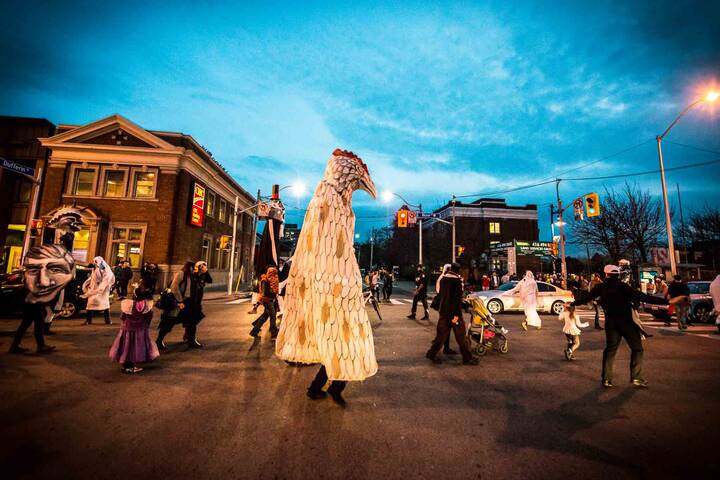
Don Quixote Symposium at U of T
This isn't going to be a great review, only because I went out of curiosity. I haven't read Don Quixote nor am I tempted to anytime soon. But that's not to say that the event sucked or anything - I think if I was a Don Quixote fan I would have really liked it, but not being one, I feel that I should just be up-front about that, and I write about my experience for what it's worth. This review is also marred by the fact that having not read it, I'm in danger of not knowing what I'm talking about, so keep that in mind. So, accept these tokens of ignorance caveat lector.
So why review it in the first place? Because I like that word - 're-view'. Because you missed it, and I was there, I can try to fill you in, paint a picture enabling you to 're-view' it.
Of course, this reminds me of the presentation by Ellen Anderson who pointed out that the word 'audience' come from the same root as 'auditory' and how in Cervantes's 17th Century, people talked about going to 'hear a play' while we say, we're going to 'see a movie'. The centuries then, divide themselves between listeners and spectators, and it makes me want to read Guy Dabord's 'Society of the Spectacle' which I haven't done yet, but at least I'll be able to tell people I was prompted to read it, and follow that curlicue of ideas after attending the Don Quixote Symposium in May 2005. So, what I'm saying here is - it wasn't a wasted night, even if I was bored and didn't stay for the whole thing. I did learn some things, and it caused me to have some thoughts, I feel they're worth sharing.
Held at the Munk Centre last Wednesday evening, I show up near 6, when it's advertised to start. I find everyone in the reception eating the usual hore-d'oeuvres. Did I miss it? Usually the grazing crowd follows the speeches. So, already I feel like they're wasting my time, but whatever. Then the speeches begin with the usual.... I'm sorry, but something needs to be done about these introductions. Every recent lecture I've attended at universities in Toronto have been preceded by painfully long sycophantic introductions. It should become vogue for them to be short and humble, and free of the idea that we've been blessed by the presence of this important person. In this case, the important person wasn't even alive - more words were said in the memory of a dead professor than the translator of the book they were selling in the foyer, the real guest of honour.
Mr. Professor's name was Geoffrey Stag and he died last November. According to the dates give, he would have been 90 so it's not like his death was tragic or anything. He had is run and shuffled off his mortal coil, but prior to that he'd retired in 1976, and taught Cervantes while he was at U of T. Not to seem callous but I don't care. I doubt anyone cared, except of course for his daughter, who we were informed, was present. My point is I didn't give up my evening for a memorial service for someone who'd worked in British Intelligence during World War II and then decided to come to the colonies to live out his life and his career. No disrespect intended, but I came for symposium on Don Quixote, which was published 400 years ago, a time span of which reminds us that our times here are petty, as are the works of those who spend their lives commenting on the achievements of others. I'll grant the memorial aspect the respect that it deserves - which is small - but it also has a whiff of the celebrity about it, as if the beloved prof's achievements were somehow on par with that of Cervantes's (a point none would admit to, including the eulogizer Mr. Rupp, but a point that I feel stands given that actions speak louder than words).
Don Quixote has recently been translated by Edith Grossman who began the talks speaking about what it means to be a translator. Now, having French as a second language has meant that I've tried my hand at translation from time to time. At the moment I should be working on something I'm prepping for my reading group, but I'm intimidated by the two last chapters I need to get finished. So, I was surprised to find that what she spoke about resonated with me. She noted that being a translator is, by definition, self-effacing - one is supposed to disappear behind the intentions of the first author. She also noted that translation is not merely matching up words in a 1 to 1 relationship; doing so is a mark of a failed translator, and given the presence on the web of translation engines such as Babeflish, we are very much aware of what she's talking about. She reminded us that translation is collaboration. She quoted Borges, who told his translator, 'write what I intended to write, rather than what I wrote'. My own experience shows this to be a very challenging game, since you have to be careful about what you assume they meant: you don't want to rewrite the book with your improvements, but also a translation is very much a version of an account, which is why her version competes for shelf space with John Rutherford's.
The presentations, from my perspective at the back, were distracted by the CBC cinematographer, running about trying to get his angles so they can be edited together later for something. At the time I figured it'd be some 30 second clip on the 11 o'clock news, but as I type this maybe it'll be for some Evan Solomon show on Newsworld.
Edith Grossman spoke first, followed by Ellen Anderson who spoke of Don Quixote's relationship to 17th Century theatre, which seemed to imply that the novel came out of Cervantes work as a playwright. It's narration and multitude of mini-stories the type of thing you'd get if you tried to describe a week of seeing plays to a gathering of friends at the pub. Because, and this didn't come up, but it's relevant, we should remember that literature in the centuries preceding our own was not only something read aloud to oneself, but also, read to the crowds who hadn't learned to read.
Anderson was followed by Rachel Schmidt, who had a Power Point slide show, as her topic was on the 'adventure of the visual image', talking about how artists have illustrated Quixote over the centuries. There were a couple of things here worth noting: for one, slide shows are what make lectures fun, and I don't have a problem with people using Power Point, and I understand that some people are still figuring out how to use the program seamlessly.
But, and this is the second thing, what drives me nuts about PP presentations is the shit design of the slides. There are like, how many different fonts on the average system? Please please please do not use Times New Roman. It is the most boring and visually banal font, its status as the default font means that its use shows a complete lack of imagination, a sense that you don't care about the aesthetics of your presentation, that you think you can just give us the bare minimum and we're so out of it that we won't notice. Look, design is easy, just make it look like what you're used to seeing everyday. That's pretty much all there is to successful amateur design - make it look like a junkmail flyer. When's the last time you saw a junkmail flyer that used a serif font? You know what I mean by serifs don't you?
So besides the fact that I'm grumpy because I've been having a rough couple of months, I just feel the need to vent a little because it's so systemic. You have this considered presentation on artists such as DorĂŠ, Dali, Goya, and Picasso who've illustrated scenes from Don Quixote, but you have this slide show which is aggravating to look at.
She connected a scene that Goya illustrated with his more famous Sleep of Reason image, but then got into the speculative diagnosis of trying to tell us that Goya encoded all this stuff into the Quixote engraving. She speculated that the fact the he drew the Quixote's sword resting as if it were resting against the arm of a chair, an arm which isn't there, had something to do with Quixote's fevered fantasies, rather than what I would say, is because Goya saw no reason to be that detailed, and that the presence of the chair's arm would distract from the overall composition. Basically, that the chair's arm would have been graphically superfluous. Goya's sketchy style with engravings is one of the reasons they're so marvelous, because engraving isn't something you'd think lends itself to sketchiness. And with sketches, you just want to summarize and hint, let the mind of the viewer fill in the missing details, work with illusions rather than meticulous detail.
As someone whose dashed off a couple of drawings now and then, I think I know what I'm talking about here, and I can tell you that back when I was in university, one of my friends referenced one of my drawings in a paper. It happens, right, this stuff is out there, and it provides an interpretive angle, so your work gets referenced in that way. I didn't read what he actually wrote, but from what he told me it was clear that he'd used my image as a sort of inspiration toward these new ideas, based around the formula, "it's like...". And I tell you this because I don't want anyone out there thinking that Goya actually intended what Ms. Schimdt told us. Sure, you can read the image that way, but I doubt that's what Goya had in mind. Which doesn't invalidate either - her argument or his image - but I wish the speculative and metaphorical aspects of interpretation where far more obvious rather than being presented as a great discovery by someone clever, swept up in the current fashion of seeing everything as a riddle. The world of texts and images are not Fermat theorems.
Ok, so that out of the way, I'll say that she began her talk around the scene in the book where Don Quixote encounters monks carrying some paintings, and she talked about what those paintings meant in the context of the post-Protestant Reformation of Catholic Europe, elucidating the context that would have been familiar to the first readers. But I wasn't that interested so that's all I can say.
She was followed by Stephen Rupp, who finally took the podium as more than moderator, to talk on 'having fun with the classics, Cervantes and Virgil'. He began by reiterating something that Grossman has raised, that Renaissance culture depended on translations, and began to talk about how the epic traditionally had always been written as poems. And then my mind began to wander. I was so dissatisfied with his academic puffery I'd zoned out to think about other things.
My notes from the event include the self-admonition, 'be nice, be fair,' because I don't want Mr. Rupp to read this and feel insulted or humiliated. But at the same time, it'd be dishonest of me to bullshit my way through the part where I stopped paying attention. And that's how I reacted, I was bored, and that seems worth telling as a critique of the evening's effectiveness. Somewhere in between our experiences - his ebullient enthusiasm for the subject, combined with his feelings of self-confidence, his enjoyment of the day and of being the dean of his department - somewhere, in the space between the front of the room, and the back, where I shifted uncomfortably with my bum falling asleep, our minds clashed in peep of fireworks invisible and unheard, snowing boredom on the gray heads below.
He could not know of my recent extreme dissatisfaction with the ivory tower, which despite all critiques and attempts at humiliation - that is, to render humble - continues to be an ivory tower, a shelter in which people can nurture a sense of their self-importance, bask in their sense of celebrity and in the rapt attention of the naĂŻve students jumping into crippling debt to sit there doodling, not to mention their comfortable salaries enabling them to indulge in luxury goods, while the rest of us contemplate going on welfare because we can't find work in our fields.
No, in the face of such bias, there's nothing he really could have done except maybe be as self-effacing as the whole task of translation demands. Because, in the end, isn't this all a form of translation? Isn't every educational enterprise about making something understandable, taking the subject to be learnt and expressing it in a language that can be grasped by the audience? But I'm not saying his (or any of the other's) language was inaccessible - no, that was fine. I'm just annoyed by the showmanship.
But that's not what I was thinking about during Rupp's entertaining presentation, since other people in the audience seemed to enjoy it. I was thinking about how I'd like to have a pint at The Green Room and wondering if my friend would be willing to bike up to Bloor to join me. In the end she wasn't up to it. Nevertheless I skipped the roundtable discussion that followed the break, since I was so bored I felt I'd just be torturing myself to stay, and I walked down Beverly St enjoying the evening of the early summer. As I walked, I did not have Don Quixote on my mind, because I'd simply been visiting a subject which so far hasn't been of much interest.
So all in all, the event was cool but I wasn't the ideal audience, my mind easily distracted by not having a grounding in fascination with the subject and my distaste for academic self-importance at the expense of what I consider to be something real and human. This review suffers from those biases and the fact that I didn't even stay for the whole thing. I want to summarize by saying: if, like me, you were merely curious, you didn't miss much. If, on the other hand, you are obsessed by Don Quixote, I'm sorry I haven't been able to give you a better report.
Latest Videos
Latest Videos
Join the conversation Load comments







